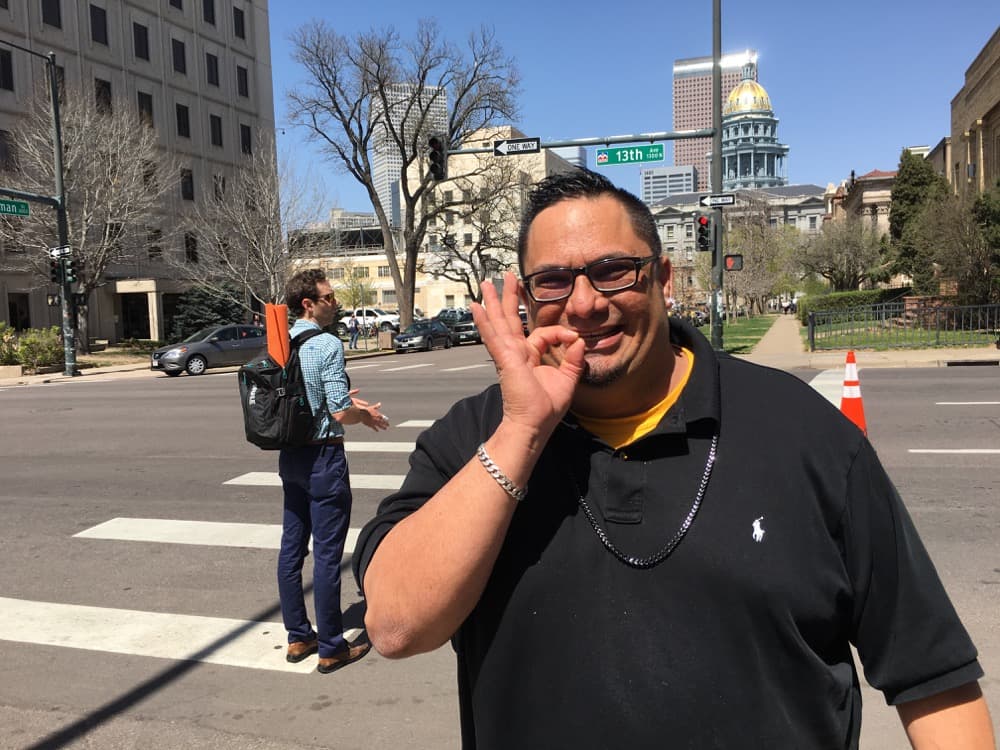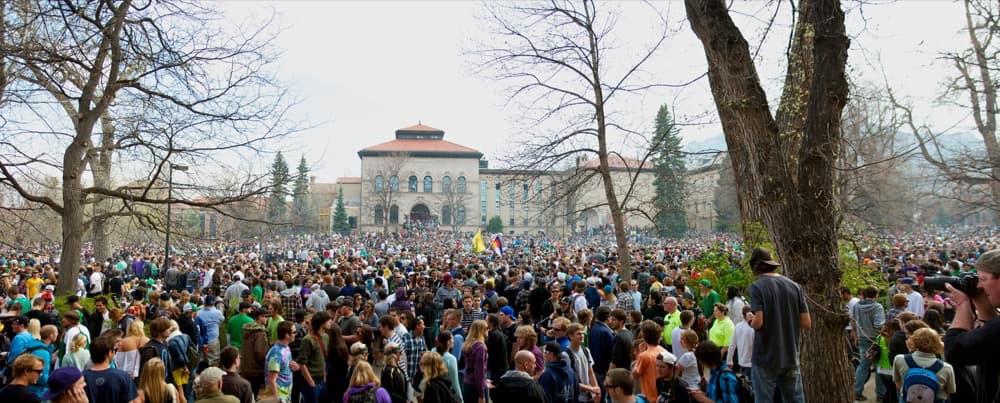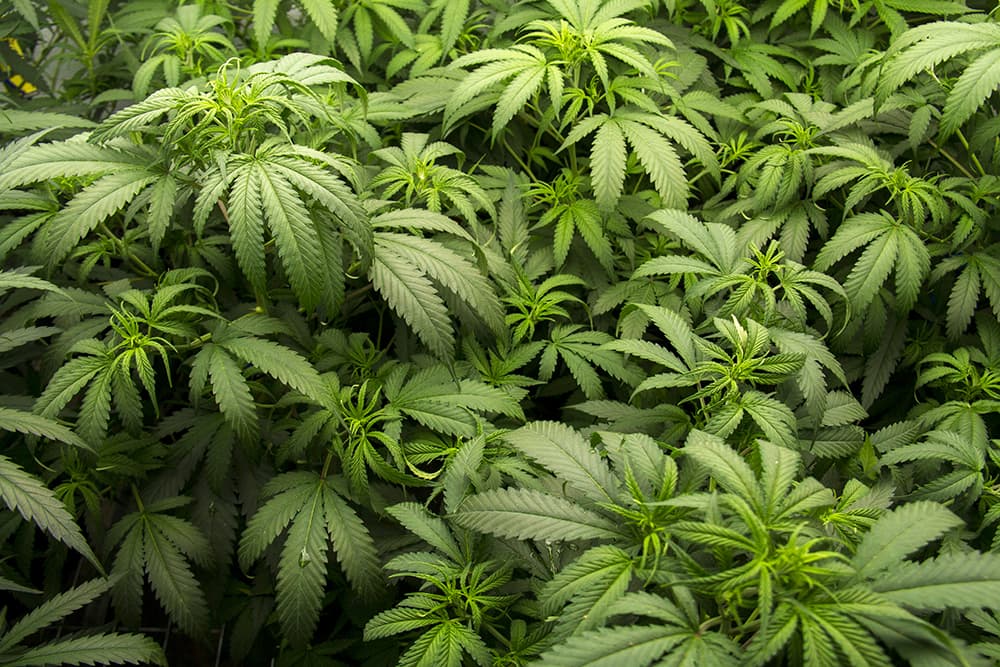
Miguel Lopez knows City Hall well. In the 1980s, he worked as an intern for Mayor Federico Peña alongside a young man named Michael Hancock.
Hancock one day would become mayor himself, while Lopez would join an underground cannabis culture that planted its seeds in Denver long before legalization.
Now Lopez is back in the halls of Denver government -- and damn it, he's stoned. As the chief organizer of Denver's massive 4/20 rally, he likes to smoke before he heads into meetings with, say, police commanders and staff.
"The next crew's coming in behind us -- they're like, 'Damn, were you smoking in there?' Because the weed was coming from our fingers, our clothes, our mouth," the 44-year-old tells me merrily just after we meet.
The weed takes the edge off the bureaucracy around his million-dollar party, which includes $75,000 for the rapper 2 Chainz to perform, according to Lopez. It's a huge event -- perhaps the biggest 4/20 gathering in the country, its organizers say.
Yet as so many others cut their dreads and turn in their tie-dye, Lopez remains a pothead of the purest strain — though, to be fair, he wears neither dreads nor tie-dye.
In the 1990s, Lopez was one of a few dozen originals who came to Civic Center Park in the 1990s to celebrate what was an outsider holiday.
"The climate was completely different then. People were huddled around each other with their heads kind of bowed down, their hoodies on, trying to be secretive, hiding and discreet in fear that the government was taking their picture," Lopez said.
He came up under the tutelage of the late Ken Gorman, whose guerrilla tactics included bong-and-bud giveaways at the state Capitol long before legalization, as Westword reported.
"This is what I grew up learning, watching, observing -- and most importantly, having installed a sense of pride and self-worth and dignity as human beings," Lopez said of the pot culture. To him, marijuana is a common bond for the working people. The laws banning it were a symbol of oppression, a way to punish poor people.
The informal 4/20 event grew over the years to include hundreds and then thousands of people. Even when federal authorities threatened and the central figures made no attempt to advertise, thousands of people still showed up.
Those early days were "very political," said Lopez, who started smoking as a teenager. "We’d also play songs like 'Fuck the Police' by NWA, or 'War Pigs' by Black Sabbath."
Last city standing:
Historically, Denver's main 4/20 competition was Boulder. "A lot of the elite, mostly white, liked to go to Boulder," Lopez said. "Denver serves and focuses on marginalized."
And, ultimately, it was the Denver event that survived. The University of Colorado Boulder event has been all but snuffed out by the University of Colorado administration, which deployed increasingly comical measures -- such as sprinklers and stinky fish fertilizer -- to keep the stoners off the quad.
"From a lot of people’s perspective in Boulder, shutting down the 4/20 thing was another example of how Boulder was becoming gentrified and not letting people have fun," said Judd Golden, an attorney who previously led the Boulder Chapter of the American Civil Liberties Union.
The ACLU considered suing the university, but ultimately decided that the school actually had a pretty good argument that a massive smoke-out did not align with its educational mission, Golden said.

Meanwhile, Denver's 4/20 has grown into possibly the largest in the nation, with consistent attendance of more than 50,000 people, as another organizer told Westword.
That's due in large part to Lopez, who in 2008 won the first official city permit for the event. He was inspired to do it by Gorman, who had been murdered the previous year. They had planned to register the event as a political rally, rooted in Lopez's upbringing in the Chicano movement.
Back in 2008, Lopez said, "most people didn’t want their name on a permit. They were afraid the government would know who they are, where they live."
Post-legalization, plenty of people would jump at the chance to host a 50,000-person party at a beautiful stone amphitheater in downtown Denver -- but Lopez was there first, which gives him priority in getting the Civic Center permit. Meanwhile, a competing event at Cheesman Park was shut down this year before it could happen.
"As soon as I got the first permit, everybody else wanted a permit -- once they see it was actually happening," he said. The city initially agreed that it was a political rally but today considers the event to be a festival, forcing the organizers to pay more, although the organizers can recoup that money from commerce at the festival.
"... I respect highly a lot of the anarchist revolutionary styles, but I thought it was more important to have an established, permitted event. And if it wasn’t going to be me, it was going to be somebody else in big business to obtain these types of things, which may exploit furthermore the community."
He's sold the production rights to Civic Center Park Productions, but he remains very much at the center of the party.

Still burning:
I've wondered whether legalization has taken the wind out of cannabis activists' sails. Is there really much politics left in the Civic Center smoke-out? Is it more than a bacchanalia?
Larisa Bolivar, a fellow organizer, acknowledged that it has felt harder in the last few years to grab people's attention for the rally's political purposes.
"They were more concerned about the party atmosphere, they were more concerned about the music," she said of the event's shift toward a festival atmosphere.
Still, Bolivar sees acts like 2 Chainz as a means to an end.
Lopez "teaches people from underserved communities about their culture, about the drug war, about why we fight -- not just because we want to smoke pot, but because it’s something that’s impacted our community and decimated them," she said.
They'll use this year's event to talk about continuing disparities in marijuana enforcement. In recent years, the number of possession charges against black and Latino teens has increased significantly, despite survey data that shows they partake at the same rate as white teens. In fact, Lopez opposed the legalization vote because he felt Amendment 64 didn't do enough to reduce criminal penalties.
White people also dominate ownership of the industry. And even with recreational legalization, people are still pretty much stuck using in their own homes, rather than in public -- for now.
Lopez takes pride in poking at the powers that be, whether inside or outside the industry. He fondly remembers calling a former city council member a "bigot" for his opposition to the 4/20 event. Lopez also plans to launch a new effort called The 4/20 Revolution.
"He has to play a very aggressive role because he feels responsible for carrying on the legacy of not just Ken but the legacy of the Chicano rights movement as well," said Bolivar, who wrote her Regis master's thesis on drug war disparities.
"The word marijuana itself was used as a derogatory term. This is a way to kind of take that back. I think it’s appropriate for someone of Chicano-Mexican descent to carry that torch, especially in Colorado."
Golden, the attorney who now volunteers for NORML, agrees that there still are plenty of issues to push -- and perhaps public celebration always will be a statement, he said.
"I think it’s a party atmosphere for a lot of people -- and that’s exactly what marijuana is, right?" he said. "That's having a good time. That’s engaging in activity that’s life, liberty and the pursuit of happiness."
The details:
Civic Center Park already was shut down as of today, April 19, to make preparations for the rally.
The main event starts at 10 a.m. on Thursday, April 20 (duh), and music runs from 2 p.m. to 6 p.m., with 2 Chainz somewhere in there. It's all free.
Marijuana use, by the way, is not condoned at Denver's 4/20 event. Denver Police Department made 64 marijuana arrests last 4/20.












